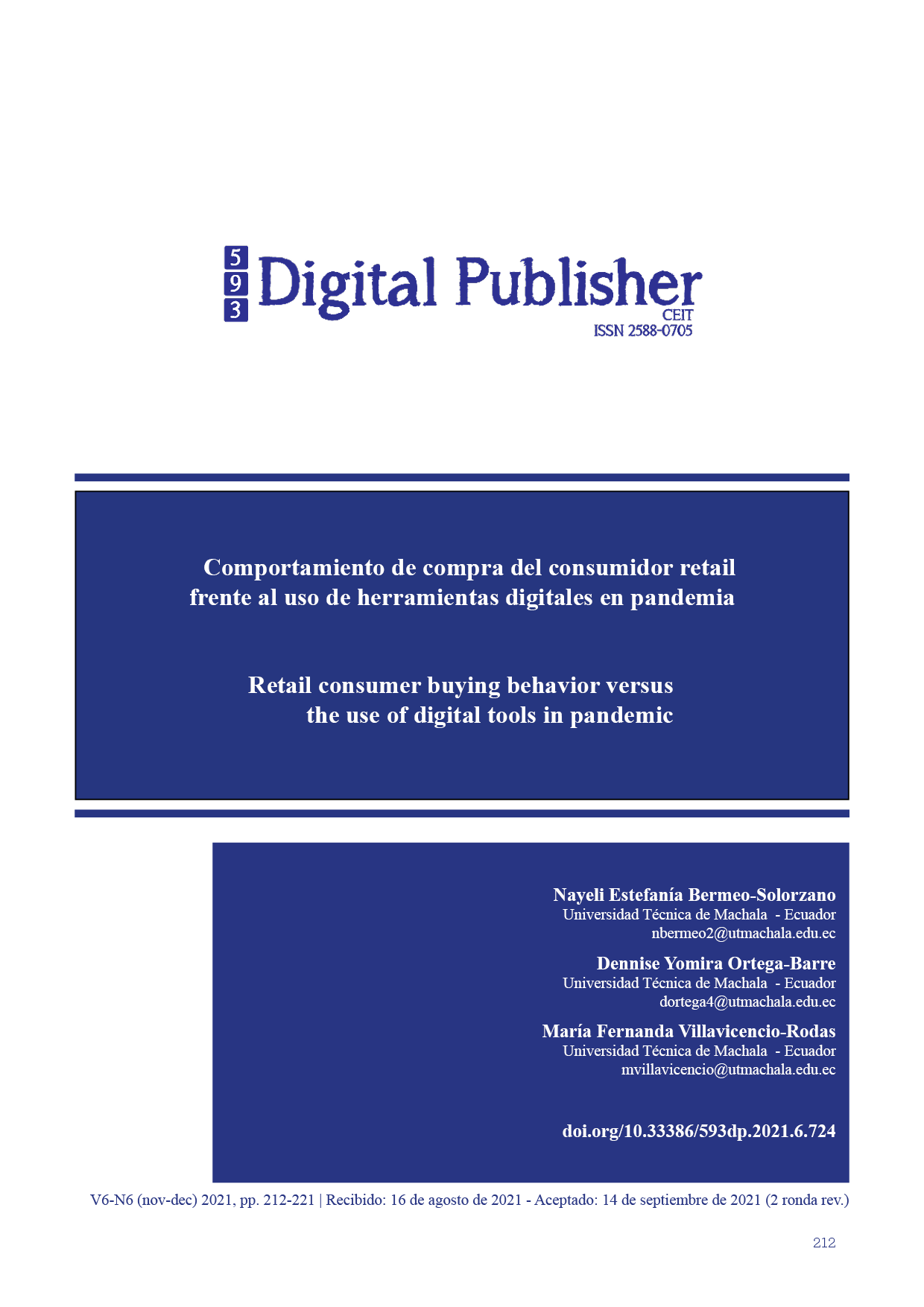Retail consumer buying behavior versus the use of digital tools in pandemic
Main Article Content
Abstract
The consumer suffers constant changes, due to environmental factors that influence their buying behavior, therefore, the objective of this study focuses on analyzing the buying behavior of the retail consumer versus the use of digital tools in the city of Machala during the COVID-19 pandemic. Since the present research is qualitative, the focus group technique was applied as a data collection tool, in addition to the analysis and interpretation of secondary sources. The session was held online and was made up of consumers from the city of Machala in the retail sector, with an age range between 26 and 45 years belonging to the male and female gender. As a result, it was determined thar for customers in the retail sector, the use of digital media became important during the health crisis, what influenced the acceleration of e-commerce, it is thus, that these platforms became the main means to maintain the buying and selling relationship between the customer and the company. In this way, it is concluded that the consumer’s buying behavior through these processes was based on the fear of contagion and the agility of purchase in the applications.
Downloads
Article Details

This work is licensed under a Creative Commons Attribution-NonCommercial-ShareAlike 4.0 International License.
1. Derechos de autor
Las obras que se publican en 593 Digital Publisher CEIT están sujetas a los siguientes términos:
1.1. 593 Digital Publisher CEIT, conserva los derechos patrimoniales (copyright) de las obras publicadas, favorece y permite la reutilización de las mismas bajo la licencia Licencia Creative Commons 4.0 de Reconocimiento-NoComercial-CompartirIgual 4.0, por lo cual se pueden copiar, usar, difundir, transmitir y exponer públicamente, siempre que:
1.1.a. Se cite la autoría y fuente original de su publicación (revista, editorial, URL).
1.1.b. No se usen para fines comerciales u onerosos.
1.1.c. Se mencione la existencia y especificaciones de esta licencia de uso.
References
Alvarez, R., & Harris, P. (2020). COVID-19 en América Latina: Retos y Oportunidades. Revista chilena de pediatría, 91(2), 179-182. doi:http://dx.doi.org/10.32641/rchped.vi91i2.2157
Banchon, S. W. (2020). Uso de herramientas de marketing digital y su incidencia en el comportamiento de compra de los consumidores de la ciudad de Guayaquil. Guayaquil: Universidad Politécnica Salesiana.
Barreto, L., & Freitas, V. (2020). Branded content and consumer engagement on facebook: An analysis of omnichannel retail (Branded Content e engajamento do consumidor no Facebook: Análise no varejo Omnichannel). Revista Brasileira de Marketing, 19(3), 540. doi:https://doi.org/10.5585/remark.v19i3.15949
Casco, A. (2020). Efectos de la pandemia de COVID-19 en el comportamiento del consumidor. INNOVARE Revista de Ciencia y Tecnología, 9(2), 98-105. doi:https://doi.org/10.5377/innovare.v9i2.10208
Cepal-Unesco. (2020). La educación en tiempos de la pandemia de COVID-19. Ecuador.
Alcázar, J. P. (2021). Ecuador Estado Digital Enero 2021. Ecuador: Mentinno.
Donthu, N., & Gustafsson, A. (2020). Effects of COVID-19 on business and research. Journal of Business Research, 117, 284-289. doi:10.1016/j.jbusres.2020.06.008
Espinel, B., Monterrosa, I., & Espinosa, A. (2019). Factores que influyen en el comportamiento del consumidor de los negocios al detal y supermercados en el Caribe colombiano. Revista Lasallista de investigación, 16(2), 4-27. doi:10.22507/rli.v16n2a1
Ferrer, L. J. (2018). Comportamiento del consumidor 2.0: nuevas realidades en entornos digitales. Revista científica, 7(1), 141-155.
González, Y. M. (2020). El lugar de la creencia en tiempos de pandemia. Argentina de Estudios de Juventud(14). doi:https://doi.org/10.24215/18524907e043
Guaña, E. J., Alvear, A. G., & Ortiz, K. J. (2015). Caracterización del consumidor digital ecuatoriano. Publicando, 2(5), 226-242. Obtenido de file:///D:/Usuario/Descargas/82-Texto%20del%20art%C3%ADculo-2920-1-10-20171010.pdf
Guaña, E., Quinatoa, E., & Pérez , M. (2017). Tendencias del uso de las tecnologías y conducta del consumidor tecnológico. Ciencias Holguín, 23(2), 1-17.
Guerrero, S. (2020). Coronavirus en Ecuador: Una opinión desde la academia. La Granja Revista de ciencias de la vida, 32(2), 127-133. doi:http://doi.org/10.17163/lgr.n32.2020.10
Kottler, P., & Armstrong, G. (2013). Fundamentos de marketing (11a ed.). México: Pearson Educación.
Lalaleo, F., Bonilla, D. M., & Robles, R. E. (2021). Tecnologías de la Información y Comunicación exclusivo para el comportamiento del consumidor desde una perspectiva teórica. Retos: Revista de Ciencias de la Administración y Economía, 11(29), 147-164. doi:https://doi.org/10.17163/ret.n21.2021.09
Lario, E. (2020). Comportamiento de compra ante el Covid-19: Un estudio transversal latinoamericano desde un enfoque del marketing sanitario. Horizonte sanitario, 20(1), 105-120. doi:https://doi.org/10.19136/hs.a20n1.3967
Larios, E., Fischer de la Vega , L., & Monteiro, T. (2021). Comportamiento de compra generacional en época de COVID-19: un estudio transversal en México, Brasil, Colombia y Ecuador. Revista Inclusiones, 8(Especial), 97 - 116.
Mariampolsky, H. (2015). Qualitative Market Research. London: SAGE Publications: Thousand Oaks.
Mercado, K., Pérez, C., Castro, L., & Macias , A. (2019). Estudio cualitativo sobre el comportamiento del consumidor en las compras en línea. Información tecnológica, 30(1), 109-120. doi:http://dx.doi.org/10.4067/S0718-07642019000100109
Montalvo, L. F., & Orozco, C. H. (2020). Disrupción digital en tiempos de pandemia efectos en el mercado tecnológico en la provincia de Manabí. Ciencias económicas y empresariales., 5(8), 353-375. doi:10.23857/pc.v5i8.1592
Montaña, M., Ollé, C., & Lavilla, M. (2020). Impacto de la pandemia de Covid-19 en el consumo de medios en España. Latina de Comunicación Social(78), 155-167. doi:https://doi.org/10.4185/RLCS-2020-1472
Ortega, M. (2020). Efectos del Covid-19 en el comportamiento de consumidor: Caso ecuador. Retos Revista de Ciencias de la Administración y Economía, 10(20), 233-247. doi:https://doi.org/10.17163/ret.n20.2020.03
Peraza, C. X. (2020). Salud laboral frente a la pandemia del COVID 19 en Ecuador. MediSur, 18(3), 507 - 511.
Porto, C. S., & Massimi , M. (2017). Contribuciones de la psicología para el marketing y el concepto de consumidor: una perspectiva histórica. Revista Psicología y Salud, 9(2), 107-120. doi:http://dx.doi.org/10.20435/pssa.v9i2.493
Prada, R., Hernández, C., & Maldonado, E. (2020). Diagnóstico del potencial de las redes sociales como recurso didáctico en el proceso de enseñanza en época de aislamiento social. Espacios, 41(42), 260-268. doi:10.48082/espacios-a20v41n42p22
Quezada, M. B., Gualán, S. L., & Ávila, V. A. (2020). Análisis del comportamiento de compra del segmento millenial frente a la pandemia Covid-19. Digital Publisher CEIT, 5(6), 300-313. doi:https://doi.org/10.33386/593dp.2020.6-1.406
Reyes, L., & Casco, A. (2020). Contrastes: Byrun Chul Han y Slavoj Zizck y los escenarios de la postpandemia. INNOVARE Revista de Ciencia y Tecnología, 9(1), 45-50. doi:https://doi.org/10.5377/innovare.v9i1.9660
Sampieri, R. (2018). Metodología de la investigación: Las rutas cuantitativas, cualitativas y mixta. México: McGraw-Hill Interamericana.
Santos, I. (2019). El comportamiento del consumidor y las nuevas tendencias del consumo ante las TIC’s. ESIC Market Economics & Business Journal , 50(3), 621-642. doi:10.7200/esicm.164.0503.4
Schiffman, L. (2010). El comportamiento del consumidor (10a ed.). México: Pearson.
Sheth, J. (2020). Impact of Covid-19 on consumer behavior: Will the old habits return or die. ELSEVIR Revista de Investigación Empresarial, 117, 280-283. doi:https://doi.org/10.1016/j.jbusres.2020.05.059
Vaca, J. F. (2019). El consumidor frente a estrategias de marketing digital en el Distrito Metropolitano de Quito. Quito: Universidad Andina Simón Bolívar.
Valarezo , J. X., Cedeño, E. D., & Novillo, E. F. (2020). Influencia de las Redes Sociales en la Rentabilidad de las Empresas, caso: Empresas ecuatorianas de Retail. INNOVA Research Journal, 5(2), 219-233. doi:https://doi.org/10.33890/innova.v5.n2.2020.1350
Villegas, F. A. (2020). Comportamiento de compra y productos de bioseguridad. Revista Científica Arbitrada de Investigación en Comunicación, Marketing y Empresa REICOMUNICAR, 3(6), 52-66. doi: https://doi.org/10.46296/rc.v3i6
Zambrano, B., Castellanos, E. B., & Miranda, M. A. (2021). El E-Commerce en las empresas ecuatorianas: Un análisis de los informes de la Cámara Ecuatoriana de Comercio Electrónico (CECE) en el marco de la pandemia covid-19. Publicando, 8(29), 13-20. doi:https://doi.org/10.51528/rp.vol8.id2176




